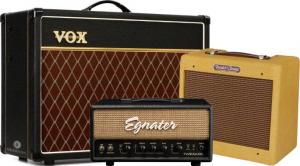Bass Ukulele: The Complete Guide

Did you know that a ukulele can produce a bass sound? At first, it might sound like a cereal box instrument rather than a real bass, but it's true!
In fact, the bass sound produced by a bass ukulele is very similar to that of a bass guitar or an upright bass. But, if you're still unconvinced, keep reading this article to learn more about how this unique instrument achieves such a sound.
This will give you a better understanding of the capabilities of this fascinating instrument.
-
What is a Bass Ukulele?
-
What Do Bass Ukuleles Sound Like?
-
How To Play a Bass Ukulele?
-
Tips for Better Bass Ukulele Playing Experience
Ukuleles are known for their bright and happy sound. But, by the end of this article, you'll understand how this bass ukulele achieves a sound that separates it from standard ukuleles.
What is a Bass Ukulele?
The ukulele is a stringed instrument originating from Hawaii. They may look like mini guitars, but they are different stringed instruments with their distinct sound and qualities. Bass ukuleles are one of its variations.
Made by a company called Road Toad, the first bass ukulele, aka "bass uke," is bass in ukulele form. It has a slightly bigger build, comparable to a baritone ukulele.
The original bass ukulele was called Big Bufo Bass. It was later replaced by the best selling Kala U bass, which is more affordable in price. This bass ukulele has huge mainstream success and is the go-to brand for bass ukuleles.
Bass ukulele models come in hollow body and solid body types. Most bass ukes have a hollow body and are acoustic-electric. They feature piezo pickups, which sit on the ukulele's bridge. A good example of this is the popular model from Kmise Ukulele, which is the Electric Acoustic Bass Ukulele.
What Do Bass Ukuleles Sound Like?
As I mentioned earlier, bass ukuleles sound like a bass guitar or an upright bass. They can hit low notes while having a mellow sound. They also have good note articulation for their small size.
Having said all that, bass ukuleles still sound unique. The upright bass and bass guitar will still sound fuller and deeper, while the bass ukulele has a brighter tonality.
As expected, bass ukes also won't have the ballsy metallic sound of electric bass guitars.
But having said all that bass ukes can get the job done, hitting similar low notes as a standard bass but with a unique, lively voicing.
More importantly, it is a compact bass instrument that even experienced bass players appreciate.
How is A Bass Ukulele Tuned?
Similar to a bass guitar, a bass ukulele is tuned to low E-A-D-G, on the same octave as bass guitars. This makes transitioning easier for those who play bass or guitar. This also means that chord shapes and scales are similar.
What Are The Different Bass Ukulele Strings?
Compact instruments are usually known for their bright and thin sound. So, for a bass ukulele to reach such low notes, some unique features need to be added.
It's truly amazing to have a deep low sound on such a small body, and to achieve this, bass ukuleles have unique strings that are made specifically for the instrument.
These are the three strings that are commonly used on the bass ukulele:
Rubber or Polyurethane Strings
-
Sound: It has a warm sound, and because it's made of rubber, these bass uke strings sound deeper and fuller than the other types. and deep.
-
Feel: These rubbery strings are very flexible and have an almost rubber-band feel to them. It has the lowest string tension of the three, making it a good option for people with wrist issues.
-
Application: It can be used for jazz, blues, rock n' roll, and rockabilly. This type of string is also viable for country music, bluegrass, tango, folk music, and other genres that utilize an upright bass.
Flatwound Strings: Chrome steel wrapped around a nylon/silk core.
-
Sound: These strings are a bit brighter than the polyurethane strings but have a warmer sound than roundwounds.
-
Feel: Because of their steel windings, these strings also have that familiar bass guitar feel. These strings also tend to have more string tension than roundwounds.
-
Application: Great for slides, but loses a bit of note definition as you slide up. These strings can also be used for slap bass, but they won't have the same definition as a regular bass.
Roundwound Strings: Nylon/silk core, with some variation of silver/copper plating.
-
Sound: These strings have a punchy sound and the brightest among the three. It has more sonic details, but tend to rattle against the frets.
-
Feel: There's just something about roundwound texture, which gives it a feel reminiscent of a standard bass guitar.
These strings still roll under your fingers when you're bending them. But they are quite challenging when doing slides, but doable.
-
Application: Its crisp sound is great for full size bass guitar style playing and can be used in genres like pop, rock, funk, and more.
Note: On a standard ukulele, it takes 1-2 weeks, but the strings bass ukes use have a minimum of 2 weeks of "break-in" time. This refers to the amount of time for strings to settle. So, if you're planning on changing the strings and using them for a gig, plan ahead.
How To Play a Bass Ukulele?
You play it like a regular bass guitar, albeit much smaller in stature and scale length.
Still, the open string notes and frets follow the same configuration, so you can easily translate regular bass lines into a bass ukulele.
Place your wrist over the ukulele's body and pluck or strum the strings.
You can use your knees to support the body or clamp it in place with your right arm.
For better stability, take a closer look at using a strap. This way, you can position its small body better, allowing you easily to reach for the strings and play.
Tips for Better Bass Ukulele Playing Experience
-
Sticky Stings: Bass ukuleles are known to have sticky strings, especially polyurethane ones. You can reduce this by applying rosin, powder, or water to your fingertips (both on the fretting and playing hands).
Some textured strings are also available, like the "Aquila Thunder Reds." They have copper powder, making them less sticky or slippy.
-
String Noise: Another way for a bass uke to achieve a low sound is for the strings to be loose. However, this has a drawback: string noise.
All the bass ukes will have string noise, but if you want to minimize it, you can use flatwound strings. They have the lowest string noise of the three strings mentioned and have better intonation.
-
It's Best Plugged-In: A bass ukulele has decent acoustic volume when played acoustically, but it won't be as loud as a bass guitar, bass clarinet, synth bass and more. If you want more projection, plug your bass ukulele into an amp or a PA system.
Final Thoughts
Amongst the different ukulele sizes, the bass ukulele can produce a sound that resembles a bass guitar or an upright bass.
This makes it a good portable alternative to the usual big-bodied bass instruments without compromising low-end.
If you are an experienced bass player, you will find that playing a bass uke is quite easy due to its standard tuning. In fact, you might feel like you're playing a miniature version of your regular bass guitar.
The bass uke is a good starting instrument for young bassists. It is smaller and more manageable than a regular bass guitar, making it easier to handle and practice.
If you are a ukulele player, adding a bass uke to your collection is an excellent way to expand your musical palette. With its low-frequency range, you can explore new sonic possibilities.
Now on to answering some common questions. If you have further questions, don't hesitate to post them in the comments section.
Frequently Asked Questions
Can I Use Bass Guitar Strings On A Ukulele?
No, bass guitar strings are way too thick to fit into the bridge holes of a ukulele. They are also much longer, meant for longer scale lengths,
In addition, bass guitar strings require very high string tension to tune and sound decent.
So, basically, if you install a set of bass strings on your ukulele, your instrument will get damaged.
Which Is Easier to Learn: Bass Guitar or Bass Ukulele?
Bass ukuleles are easier to learn and play than bass guitars.
For starters, a bass uke has thinner strings than traditional bass guitar strings, which require less force to fret.
Another reason is its shorter scale length and narrower fret spaces, which make it ideal for young beginners.
Its small and lightweight body is great, especially for kids who want to start learning.
Still, you should skip this if you have big hands or want to learn to play strictly on an electric bass guitar.
What Is A Fretless U Bass?
Most ukuleles are fretted, so fretted bass ukuleles are the default option. If you want to go for the rare fretless bass ukulele, you'll get a few advantages.
The first is intonation. Bass ukuleles are prone to intonation problems. Having a fretless design lets you zero in on the right pitch better.
Second, polyurethane strings will stretch due to it being a softer material. Pressing them against metallic fret wires will stretch the strings faster. This means you can get more use out of your rubber strings with a fretless u-bass.
The same downsides to fretless instruments apply to fretless ukulele basses.
You need to master the neck positions to get the right pitch, so this is not an option for beginners. The tone will also be different compared to a fretted bass.
Contributors:
- Jerome Arcon - Co-writer
- Jerry Borillo - Illustrator












